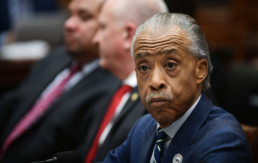Rev. Al Sharpton On The Black Evangelical Vote
As published in Religion Unplugged
Rev. Al Sharpton On The Black Evangelical Vote
Kelly Davis | kwd2111@columbia.edu
While upwards of 80 percent of black Americans have voted Democrat since the 1960’s, many are also Christians. As such, black voters make up the most conservative block of the Democratic Party.
Forty percent of black Democrats describe themselves as moderates, while 25 percent identify as conservative and 29 percent identify as liberals, compared to 55 percent of white Democrats, according to Pew Research. Fifty-five percent of black Democrats say belief in God is necessary for morality, compared to 89 percent of white Democrats who say morality is not linked to religion. And while 24 percent of black men approve of Trump, only 6 percent of black women do.
Trump’s opposition to abortion and support for traditional family values has appealed to many evangelical Christians, and black evangelicals are no exception. Only 51 percent of black Americans support same-sex marriage compared to 62 percent of white Americans, regardless of religious affiliation. Among two prominent black Protestant traditions, 74 percent of Church of God in Christ members and 68 percent of National Baptist Convention members said they strongly oppose same-sex marriage in 2014.
Still, 80 percent of black evangelicals who voted in the midterm elections in 2018 disapproved of Trump, according AP VoteCast, and in 2016, only 6 percent of black voters supported Trump.
Rev. Al Sharpton, civil rights leader and host of PoliticsNation on MSNBC, sat down with Religion Unplugged to discuss why some black evangelicals support the Trump administration and its policies.
“Life for blacks and whites in this country is still much different and that is also true in the evangelical community,” Sharpton said. “So they may agree with some of what white evangelicals preach, but when it comes to how their lives are going to be managed and governed, there’s a difference because they understand they’re going to be governed differently.” When asked about whether people of faith should consider their personal morals and values while voting, Sharpton said he ultimately believes that there is nothing wrong with that.
“Now that does not mean you want to see the tenants of a given church or the dogma of a church in government,” Sharpton said. “I think that there is a division between church and state but there is not a division between the voter and the voter’s values.”
Sharpton also weighed in on a clip of black pastors and leaders in Wichita, Kansas who claim that Trump touts Christian values but his actions contradict Biblical values. The leaders urged that evangelical voters weigh more than same-sex marriage and abortion in their 2020 vote for president.
“Jesus did not preach to hate homosexuals, nor did he preach that the only life to sanctify is in vitro,” said Lincoln Montgomery, pastor of Tabernacle Bible Church.
“There were 22 Republican candidates that all probably felt the same about abortion, probably felt the same about everything else that traditionally we care about as people of faith,” Councilman Brandon Johnson said. “Why didn’t you vote for them?
Sharpton agrees evangelical support for the president can be hypocritical.
“I think it’s very clear that even in the faith community there is a very serious polar view of Donald Trump,” Sharpton said. “You can only wonder how some of the white evangelicals can preach one thing and give him a pass.”
Sharpton also watched a clip of black laypeople expressing relief that the president is putting traditionally Christian values at the forefront (for example, Trump’s dedication to appoint exclusively pro-life judges.)
“What’s the other side?” Benji Irby, from Queens, said. “Either you go with Trump and you deal with Christian family values, or you go with them, and you’re dealing with transgender everything, abortion everything.”
“Being a Christian, I don’t see absolutely no way to vote for the Democrats,” said Derrick Gibson, also from Queens. He reasoned that Democrats support “nine-month abortions, infanticides, and transgendering,” which he says is a desecration of the body.
Sharpton argued that it is not so simple.
“I may disagree with abortion personally,” Sharpton said. “That’s not the issue. The issue is do I have the right to put my personal will on another person? Suppose someone of a different religion becomes president. Do they have a right to make me as a Baptist illegal?”
According to Pew Research, 25 percent of all Americans identify as evangelical Protestants, while black evangelicals make up just six percent. Sharpton said that if the 2020 election ends in a tight race, the black evangelical vote could make all the difference.
“To be Biblical, sometimes you have to take smooth stones to bring down Goliath,” Sharpton said, referencing the Bible story of David, a young shepherd boy who defeated a giant with God’s help and later became a king. “If it’s close, six percent might weigh in a lot.”

